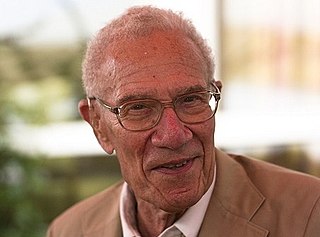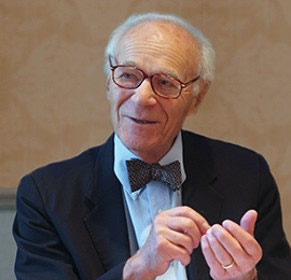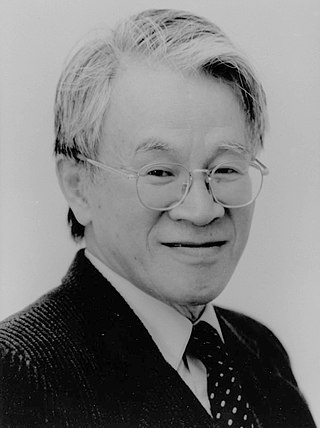Related Research Articles

James Joseph Heckman is an American economist and Nobel laureate who serves as the Henry Schultz Distinguished Service Professor in Economics at the University of Chicago, where he is also a professor at the College, a professor at the Harris School of Public Policy, Director of the Center for the Economics of Human Development (CEHD), and Co-Director of Human Capital and Economic Opportunity (HCEO) Global Working Group. He is also a professor of law at the Law School, a senior research fellow at the American Bar Foundation, and a research associate at the NBER. He received the John Bates Clark Medal in 1983, and the Nobel Memorial Prize in Economic Sciences in 2000, which he shared with Daniel McFadden. He is known principally for his pioneering work in econometrics and microeconomics.

Ragnar Anton Kittil Frisch was an influential Norwegian economist known for being one of the major contributors to establishing economics as a quantitative and statistically informed science in the early 20th century. He coined the term econometrics in 1926 for utilising statistical methods to describe economic systems, as well as the terms microeconomics and macroeconomics in 1933, for describing individual and aggregate economic systems, respectively. He was the first to develop a statistically informed model of business cycles in 1933. Later work on the model together with Jan Tinbergen won the two the first Nobel Memorial Prize in Economic Sciences in 1969.

Robert Emerson Lucas Jr. was an American economist at the University of Chicago. Widely regarded as the central figure in the development of the new classical approach to macroeconomics, he received the Nobel Prize in Economics in 1995 "for having developed and applied the hypothesis of rational expectations, and thereby having transformed macroeconomic analysis and deepened our understanding of economic policy". He was characterized by N. Gregory Mankiw as "the most influential macroeconomist of the last quarter of the 20th century". In 2020, he ranked as the 10th most cited economist in the world.

Robert Merton Solow, GCIH was an American economist and Nobel laureate whose work on the theory of economic growth culminated in the exogenous growth model named after him. He was Institute Professor Emeritus of Economics at the Massachusetts Institute of Technology, where he was a professor from 1949 on. He was awarded the John Bates Clark Medal in 1961, the Nobel Memorial Prize in Economic Sciences in 1987, and the Presidential Medal of Freedom in 2014. Four of his PhD students, George Akerlof, Joseph Stiglitz, Peter Diamond, and William Nordhaus, later received Nobel Memorial Prizes in Economic Sciences in their own right.

Lawrence Robert Klein was an American economist. For his work in creating computer models to forecast economic trends in the field of econometrics in the Department of Economics at the University of Pennsylvania, he was awarded the Nobel Memorial Prize in Economic Sciences in 1980 specifically "for the creation of econometric models and their application to the analysis of economic fluctuations and economic policies." Due to his efforts, such models have become widespread among economists. Harvard University professor Martin Feldstein told the Wall Street Journal that Klein "was the first to create the statistical models that embodied Keynesian economics," tools still used by the Federal Reserve Bank and other central banks.

Sir Clive William John Granger was a British econometrician known for his contributions to nonlinear time series analysis. He taught in Britain, at the University of Nottingham and in the United States, at the University of California, San Diego. Granger was awarded the Nobel Memorial Prize in Economic Sciences in 2003 in recognition of the contributions that he and his co-winner, Robert F. Engle, had made to the analysis of time series data. This work fundamentally changed the way in which economists analyse financial and macroeconomic data.

Ross McKitrick is a Canadian economist specializing in environmental economics and policy analysis. He is a professor of economics at the University of Guelph, and a senior fellow of the Fraser Institute.

William Jack Baumol was an American economist. He was a professor of economics at New York University, Academic Director of the Berkley Center for Entrepreneurship and Innovation, and Professor Emeritus at Princeton University. He was a prolific author of more than eighty books and several hundred journal articles. He is the namesake of the Baumol effect.

Tjalling Charles Koopmans was a Dutch-American mathematician and economist. He was the joint winner with Leonid Kantorovich of the 1975 Nobel Memorial Prize in Economic Sciences for his work on the theory of the optimum allocation of resources. Koopmans showed that on the basis of certain efficiency criteria, it is possible to make important deductions concerning optimum price systems.

Michio Morishima was a Japanese heterodox economist and public intellectual who was the Sir John Hicks Professor of Economics at the London School of Economics from 1970 to 1988. He was also professor at Osaka University and member of the British Academy. In 1976 he won the Order of Culture.

Sir Angus Stewart Deaton is a British economist and academic. Deaton is currently a Senior Scholar and the Dwight D. Eisenhower Professor of Economics and International Affairs Emeritus at the Princeton School of Public and International Affairs and the Economics Department at Princeton University. His research focuses primarily on poverty, inequality, health, wellbeing, and economic development.

Sir Christopher Antoniou Pissarides is a Cypriot economist. He is Regius Professor of Economics at the London School of Economics, and Professor of European Studies at the University of Cyprus. His research focuses on macroeconomics, labour economics, economic growth, and economic policy. In 2010, along with Peter Diamond and Dale Mortensen, he received the Nobel Prize in Economics, "for their analysis of markets with theory of search frictions."

Sir Richard William Blundell CBE FBA is a British economist and econometrician.

Dale Weldeau Jorgenson was the Samuel W. Morris University Professor at Harvard University, teaching in the department of economics and John F. Kennedy School of Government. He served as chairman of the department of economics from 1994 to 1997.

Leonid Hurwicz was a Polish–American economist and mathematician, known for his work in game theory and mechanism design. He originated the concept of incentive compatibility, and showed how desired outcomes can be achieved by using incentive compatible mechanism design. Hurwicz shared the 2007 Nobel Memorial Prize in Economic Sciences for his seminal work on mechanism design. Hurwicz was one of the oldest Nobel Laureates, having received the prize at the age of 90.
John Michael Van Reenen OBE is the Ronald Coase School Professor at the London School of Economics. He is also Director of the Programme On Innovation and Diffusion (POID) at the Centre for Economic Performance. He was appointed an Officer of the Order of the British Empire (OBE) and received the Yrjö Jahnsson Award.
Panicos Onisiphorou Demetriades in Limassol, Cyprus, is a Cypriot economist, currently Professor of Financial Economics at the University of Leicester. During 3 May 2012 - 10 April 2014, Demetriades was a European Central Bank Governing Council member and the Governor of the Central Bank of Cyprus. According to RePEC he is in the top 2% of economic authors in Europe. He is the author of "A Diary of the Euro Crisis in Cyprus: Lessons for Bank Recovery and Resolution", published by Palgrave Macmillan in 2017.

Paul Allan David was an American academic economist, noted for his work on the economics of scientific progress and technical change. He was also well-known for his work in American economic history and in demographic economics.
Hans-Joachim Voth is a German economic historian. He joined the University of Zurich economics faculty in 2014 and has been the Scientific Director of the UBS Center for Economics in Society since 2017. In 2022, he was elected as a Fellow of the Econometric Society.
References
- 1 2 3 Knowles, S., and McCombie, J. (2002), "Erkin Bairam: 1958-2001 His contribution to economics", Economics Discussion Papers No. 0212, University of Otago.
- 1 2 3 Knowles, S., and McCombie, J. (2003), "Erkin Bairam’s Contribution to Economics", Ekonomia, 6: 1-18.
- ↑ "Erkin Bairam Memorial Prize". University of Otago. Archived from the original on 2 June 2010. Retrieved 18 July 2012.